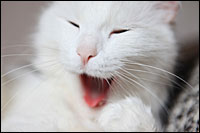Pet Tips
Bad Breath in Cats – Pet tip 189

When a cat has bad breath (feline halitosis) it is usually a sign of a dental problem or some type of illness. The natural smell of your cat’s breath might not be as minty-fresh as a mouthwash commercial might suggest, but it should be bearable and not make you wince. After all, cats do eat a lot of fish and other meats in their diet, and this does give a cat’s breath a certain smell especially after it has just eaten. When we are talking about bad breath in cats, we’re talking “really bad” and it should differ from the breath’s normal smell.
Halitosis in cats is a common problem and more often than not the problem resides in your cat’s mouth. Excess plaque and tartar buildup are known to cause bad breath in cats. Although many people know they should brush their cat’s teeth, few cat owners actually do. When the tarter and plaque builds up to an even greater degree, very few cat owners actually bring their pets to the vet for a dental cleaning. For many cats, this should be done at least once a year. Imagine how bad our own human breath would smell if we never brushed our teeth and never went to the dentist? Aside from the bad breath, excess plaque and tartar can cause gingivitis (gum disease) and if that is left untreated further damage to the mouth, liver and kidneys are possible consequences. If you do decide to brush your cat’s teeth, it’s easiest to start when they are kittens, and you’ll need to use a special cat tooth-paste and tooth-brush. Your veterinarian will be able to tell you all about this and give you a demonstration.
Aside from tooth-brushing there are specialty diets that can help with plaque and tartar buildup. These foods are normally harder and crunchier and the hard bits help to remove plaque and tarter. Although wet/soft cat foods do have advantages like more water, in terms of your cat’s teeth, wet cat food is not recommended. There are also many types of treats that can also have a positive effect on controlling plaque and tartar.
There are also other diseases that can cause bad breath in cats that do not originate in the mouth. Diabetes, stomach problems, kidney problems and lung disease can all contribute to feline bad breath. Given the serious consequences of bad breath in cats, don’t just live with it, take your cat to the vet and get to the root of the problem.
If the vet suggests nothing is wrong with the cat but you still wish to freshen its breath, there are additives to freshen the breath of cats and dogs that can be put in your pet’s water dish that can help. Ask your vet about these types of products.
